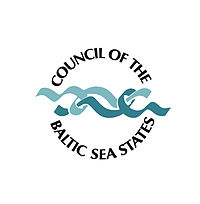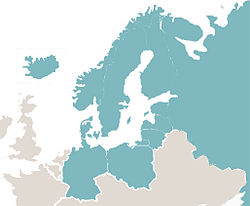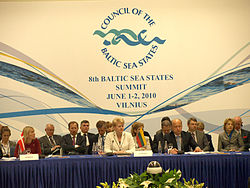- Council of the Baltic Sea States
-
CBSS 
Council of the Baltic Sea States
Formation 1992 (CBSS) Type Regional/Intergovernmental Organization Headquarters Stockholm, Sweden Official languages English CSO Chairmanship Dag Briseid Director General (Secretariat) Jan Lundin Main organ CBSS Secretariat
P.O.Box 2010, Slussplan 9, Gamla Stan, 103 11 Stockholm SWEDEN Tel: +46 8 440 19 20 Fax: +46 8 440 19 44Website http://www.cbss.org/ 
 Räntmästarhuset, Slussplan 9
Räntmästarhuset, Slussplan 9The Council of the Baltic Sea States (CBSS) is an overall political forum for regional intergovernmental cooperation which addresses the five priority areas of the environment, economic development, energy, education and culture, civil security and human dimension, including trafficking in human beings.
Contents
History
The CBSS was established by the region’s Foreign Ministers in Copenhagen in 1992 as a response to the geopolitical changes that took place in the Baltic Sea region with the end of the Cold War. Since its founding, the CBSS has contributed to ensuring positive developments within the Baltic Sea region and has served as a driving force for multi-lateral co-operation.
Since 1998 the CBSS has been serviced by a permanent international Secretariat that is located in Stockholm, Sweden and funded by the Member States.
As of 1998, a permanent Secretariat has been established in Stockholm. The highest institution of CBSS is the conference of foreign ministers, which convenes every two years.
Member states
The CBSS has 12 member states:
 Denmark
Denmark Estonia
Estonia Finland
Finland Germany
Germany Iceland (1995)
Iceland (1995) Latvia
Latvia Lithuania
Lithuania Norway
Norway Poland
Poland Russia
Russia Sweden
Sweden European Commission
European Commission
Observer states
Other countries have observer status:
 Belarus
Belarus France
France Italy
Italy Netherlands
Netherlands Romania
Romania Slovakia
Slovakia Spain
Spain Ukraine
Ukraine United Kingdom
United Kingdom United States of America
United States of America
Presidencies
 Norway 2010-2011
Norway 2010-2011 Lithuania 2009-2010
Lithuania 2009-2010 Denmark 2008-2009
Denmark 2008-2009 Latvia 2007-2008
Latvia 2007-2008 Sweden 2006-2007
Sweden 2006-2007 Iceland 2005-2006
Iceland 2005-2006 Poland 2004-2005
Poland 2004-2005 Estonia 2003-2004
Estonia 2003-2004 Finland 2002-2003
Finland 2002-2003 Russia 2001-2002
Russia 2001-2002 Germany 2000-2001
Germany 2000-2001 Norway 1999-2000
Norway 1999-2000 Lithuania 1998-1999
Lithuania 1998-1999 Denmark 1997-1998
Denmark 1997-1998 Latvia 1996-1997
Latvia 1996-1997 Sweden 1995-1996
Sweden 1995-1996 Poland 1994-1995
Poland 1994-1995 Estonia 1993-1994
Estonia 1993-1994 Finland 1993-1994
Finland 1993-1994
Structure
Committee of Senior Officials
The Committee of Senior Officials (CSO) consists of high ranking representatives of the Ministries of Foreign Affairs of the 11 CBSS Member States as well as of the European Commission. The CSO serves as the main discussion forum and decision-making body for matters related to the work of the Council between Ministerial Sessions. The CSO monitors, facilitates and aims to coordinate the work of all CBSS structures.
The period chaired by each country rotates on an annual basis and follows the Council Presidency. The CSO Chairman is a representative, usually at ambassadorial level, appointed by the Ministry of Foreign Affairs of the country which holds the Council Presidency.
A number of CBSS structures are operating under the auspices of the CSO. The CBSS is currently undergoing a reform. In accordance with the Riga Declaration on the Reform of the CBSS from June 2008 one of the former working groups has been transformed into an Expert Group and the two other working groups have been dissolved.
The CSO monitors the work of the Expert Group on Nuclear and Radiation Safety, the Task Force against Trafficking in Human Beings and coordinates the work undertaken in the agreed five long-term priorities. This includes the Expert Group on Cooperation on Children at Risk, the Expert Group on Youth Affairs, the Lead Country Function of the EuroFaculty Project in Pskov and in the foreseeable future also the forthcoming work of the Expert Group on Maritime Policy as well other potential new initiatives.
Expert Groups
- CBSS Expert Group on Nuclear and Radiation Safety
- CBSS Expert Group on Maritime Policy
- CBSS Expert Group on Sustainable Development - Baltic 21
- CBSS Experts Group on Customs Cooperation and Border Crossing Aspects
- CBSS Expert Group on Youth Affairs
- CBSS Expert Group for Cooperation on Children at Risk
- The Task Force against Trafficking in Human Beings
Secretariat
A Permanent International Secretariat of the CBSS was established following a decision taken at the 7th Ministerial Session of the CBSS in 1998 in Nyborg, Denmark. The Secretariat was officially inaugurated at its premises on the island of Strömsborg in Stockholm on 20 October 1998.
The mandate of the Secretariat is as follows:
- to provide technical and organisational support to the Chairman of the CBSS and the structures and working bodies of the Council;
- to ensure continuity and enhanced coordination of CBSS activities;
- to implement the CBSS Information and Communication Strategy;
- to maintain the CBSS archives and information database;
- to maintain contacts with other organisations operating in and around the Baltic Sea region, the national authorities of Member States and the media.
Dissolved bodies
In 1992-2009, a Working group on democratic institutions had existed[1]; in 1995-2003, it was supplemented by the Commissioner on Democratic Development.[2]
Strategic Partners
- B7 Baltic Seven Islands
- BASTUN
- BCCA
- Baltic Development Forum
- Baltic Sea Forum
- BSPC
- BSSSC
- BUP
- Business Advisory Council
- CPMR
- HELCOM
- NGO Forum
- OECD
- ScanBalt
- UBC
- VASAB
See also: Baltic sea countriesReferences
External links
Categories:- Baltic Sea
- International organizations of Europe
Wikimedia Foundation. 2010.

